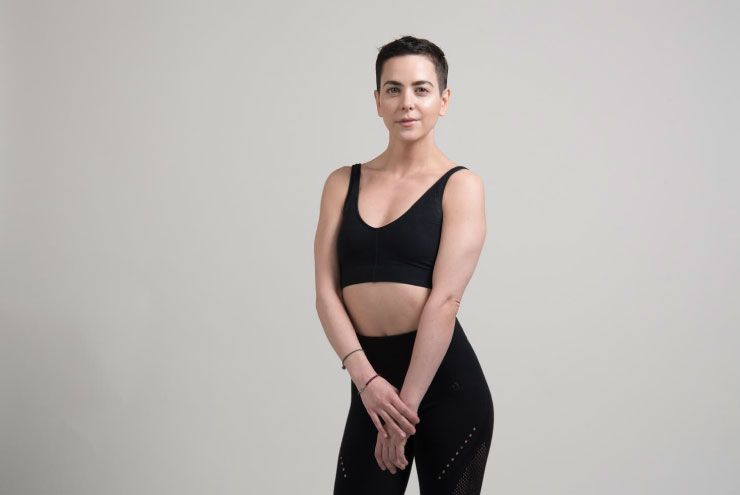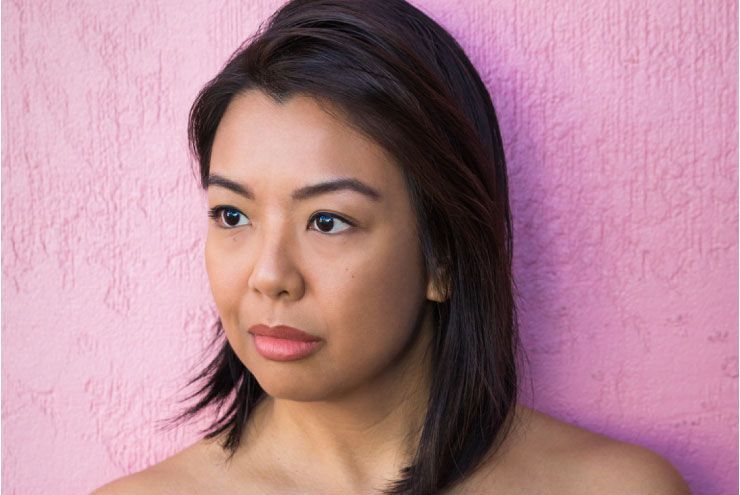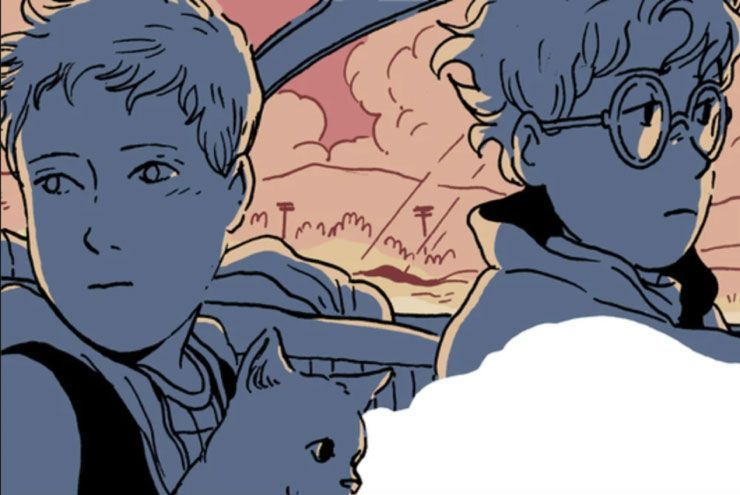By Barrett White
Downstairs from street level, I sit in a quaint Manhattan coffee shop, nestled in the bustling hubbub of the Flatiron District. I recognize Bethany C. Meyers’ energy the moment they walk in, despite the heavy coat enveloping their petite frame, the bulky headphones, and celebrity sunglasses.
Meyers, a Missouri native who uses they/them pronouns, has dedicated their life to exploring themself, what it means to love—yourself and others—and how to impart that love onto others through their body-positive workout routines. Their social media presence is forever candid for those who check in daily for their musings and updates on routines.
Transparency is a staple of their life in the spotlight. Back in March, Meyers tied the knot with long-time partner, actor Nico Tortorella, who is best known for their role in TV Land’s Younger, their book of poetry hot off the press, and their podcast, The Love Bomb, where Tortorella and Meyers explore what it means to love in the first episode. For the couple, transparency with the public about their relationship means visibility for nontraditional couples all over the world. Both Meyers and Tortorella consider themselves sexually fluid and use gender neutral pronouns—which is where the labels stop.
Meyers, who has been labeled as “lesbian” and “bisexual” before, explains why they and Tortorella prefer the term “fluid,” and why labels themselves escape them: “I think that everyone should feel the ability to be able to change, shift, grow, evolve, have different opinions, have different experiences, have different loves, try different words, and see what that means and feels like to them. And I don’t know that it’s ever about coming to the right one, and thinking, ‘Oh, now I’ve reached it,’ but rather having the one that’s right for you in that moment in time and allowing it to grow . . . I don’t want to label it, I want to love the people that I love.”
Meyers considers themself active within the lesbian community, “but I also have this amazing human, Nico, who is queer and who is my foundation and solid everything. And I wish I could find a label for that.” The pair has never belonged in a box, and for other couples exploring what sexuality, monogamy, and polyamory mean, they don’t claim to be the experts. “This will always be us, exploring and figuring it out.”
Though Meyers is a New Yorker these days, they grew up much less metropolitan. Born and raised in small-town Missouri, queer ideology was less of an identity and more of a socially–punishable offense. “I was raised with a lot of love, but not necessarily a lot of knowledge of the world and what it means to exist in the world,” Meyers says. Now removed from their rural Bible Belt upbringing, Meyers recognizes their queer childhood crushes, and the repressive mentality of “queer equals bad,” that was ingrained in them. “When you’re a kid, you don’t want to be bad, so you never allow yourself to place those feelings, which often go overlooked because to you, it was just ‘wrong.’”
As a university student in Chicago, Meyers was able to explore a major metropolitan area for the first time. “Nico was the first person who ever questioned my beliefs—they weren’t threatening, they were curious. They just weren’t raised that way,” Meyers says of Tortorella, long before they found fame as an actor, podcaster, and author. “I didn’t have the answers [to their questions]. ‘Because that’s what I’ve been told’ [was all I could offer] and it was terrifying.”
Meyers’ words gave me pause to think about the rural South, the Bible Belt, and the lives of queer folk outside of this borough in New York. Why are we pressured to wait until college to explore our queer identities, as Meyers (and I) did? Where is the breakdown in equality and how do we make America safer for queer youth? The answer, Meyers poses, lies in queer spaces. “Lots of gay people leave small towns for big cities, but it’s possible, of course, that there are many who haven’t left, who are still closeted, who are looking to feel comfortable.” Pride wells in Meyers’ face as they report that their small hometown now has a gay bar with a drag show night. Progress, even the smallest step, is progress. “Small towns need more knowledge and less fear,” they say.
After university, Meyers fled the biting Chicago winters for balmy Los Angeles to work in public relations—what they studied in university—and promptly quit. “I hated it; I quit right away,” they laugh. Noting their penchant for fitness, they took up work at a fitness studio that specialized in Megaformers routines. In LA, they struggled with an eating disorder, toxic relationship, and crazy work hours while chasing happiness from the outside-in. When Meyers got wind that a coworker was opening a fitness studio in Dallas, they cut the LA toxicity from their life, and moved to Texas to open Dallas’ first boutique workout studio. “Texas is where I feel like work took off and I really developed my career,” Meyers says.
But soon, opportunities for success in the Dallas fitness scene dried up, and it was time for another change. By this time, Tortorella was in New York. The pair had been close since their days in Chicago, so the nomad that they were, Meyers packed up and crossed the country once again, and took a job teaching Megaformers at New York’s celebrated SLT fitness studio. But their stay in the Big Apple was off to a rocky start. “My apartment was small, I could barely make rent, there were maybe two people in my classes—a big adjustment had to be made,” they share.
So, they doubled down and owned their unique style. “I told myself, ‘I know what I’m doing is right. I know this works.’ I stopped questioning myself and I took control”—a power move that would propel SLT from one to 12 studios, with Meyers training the managers at each.
With their legacy preceding them, Meyers stepped down from SLT to focus on the project they lead today: be.come. From their Instagram, they post snippets of workouts, ask loyal followers for questions and concerns, and offer advice on more complicated movements, all while encouraging confidence through their own transparency. The project promises fitness without the intimidation, without the pretension, and without the daunting before and after photos.
“Everyone does it. That’s like, the formula of fitness,” Meyers says. “That’s the clickbait. ‘Lose x-amount of weight in x-amount of time,’ and a lot of times, when we’re at our thinnest, we’re not at our happiest or healthiest.” As a survivor of an eating disorder themself, they recognize this potential trigger. They instead promote confidence in movement rather than a goal weight everyone needs to achieve to feel like they’ve made it. “It’s the alignment of Pilates, the lengthening of yoga, and the musicality of dance,” Meyers explains. “It’s by no means a dance class, but it’s all done to beat and rhythm, alignment as a main consideration.”
In August 2017, as Hurricane Harvey made landfall in Texas, Meyers was hard at work beta testing be.come. They took to Instagram to check on their Houston followers to be met with updates on flooding, photos of news reports, and live reactions to evacuations and recovery. Though Texas had long been in their rearview mirror, the people of Texas never left their heart. Meyers checked in with a former colleague in Dallas, who informed them of a fitness fundraiser they would be hosting, benefitting Houston’s recovery. Without a second thought, Meyers was on a plane to Dallas. “As I build my business, philanthropy is becoming more and more important,” Meyers says. “[My business is] already so people-centered; it just makes sense. I want to give back. It’s how you change the world and everyone should do it.”
Their continued efforts to change the world for the better were seen after the Parkland shooting, when they hosted another fitness event, donating 50 percent of the proceeds to Everytown, and 50 percent to March for Our Lives.
Looking forward, Meyers is giddy to premiere their new app for the be.come project this June. The app thrived during its three-month beta period at three times Meyers’ goal, ultimately helping them forgo an investor entirely.
With business booming for the young fitness mogul and a new (in every sense of the term) marriage on the books, Bethany C. Meyers is certainly a queer businessperson to watch, a role model for the up-and-coming, and a budding philanthropist we can all take a cue from.
You can find Bethany C. Meyers on Instagram at @bethanycmeyers. The be.come project app will be available for download in June 2018.







